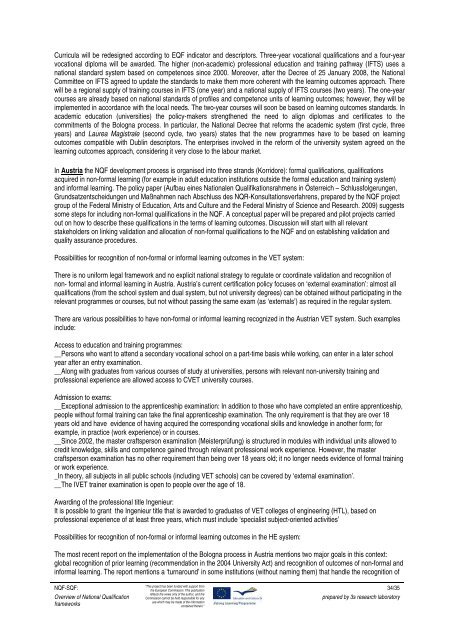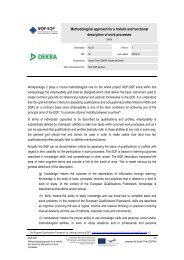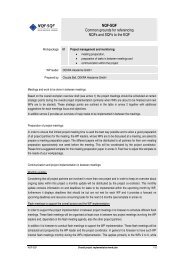Overview of National Qualification frameworks - Project-Nqf-Sqf
Overview of National Qualification frameworks - Project-Nqf-Sqf
Overview of National Qualification frameworks - Project-Nqf-Sqf
You also want an ePaper? Increase the reach of your titles
YUMPU automatically turns print PDFs into web optimized ePapers that Google loves.
Curricula will be redesigned according to EQF indicator and descriptors. Three-year vocational qualifications and a four-yearvocational diploma will be awarded. The higher (non-academic) pr<strong>of</strong>essional education and training pathway (IFTS) uses anational standard system based on competences since 2000. Moreover, after the Decree <strong>of</strong> 25 January 2008, the <strong>National</strong>Committee on IFTS agreed to update the standards to make them more coherent with the learning outcomes approach. Therewill be a regional supply <strong>of</strong> training courses in IFTS (one year) and a national supply <strong>of</strong> IFTS courses (two years). The one-yearcourses are already based on national standards <strong>of</strong> pr<strong>of</strong>iles and competence units <strong>of</strong> learning outcomes; however, they will beimplemented in accordance with the local needs. The two-year courses will soon be based on learning outcomes standards. Inacademic education (universities) the policy-makers strengthened the need to align diplomas and certificates to thecommitments <strong>of</strong> the Bologna process. In particular, the <strong>National</strong> Decree that reforms the academic system (first cycle, threeyears) and Laurea Magistrale (second cycle, two years) states that the new programmes have to be based on learningoutcomes compatible with Dublin descriptors. The enterprises involved in the reform <strong>of</strong> the university system agreed on thelearning outcomes approach, considering it very close to the labour market.In Austria the NQF development process is organised into three strands (Korridore): formal qualifications, qualificationsacquired in non-formal learning (for example in adult education institutions outside the formal education and training system)and informal learning. The policy paper (Aufbau eines <strong>National</strong>en Qualifikationsrahmens in Österreich – Schlussfolgerungen,Grundsatzentscheidungen und Maßnahmen nach Abschluss des NQR-Konsultationsverfahrens, prepared by the NQF projectgroup <strong>of</strong> the Federal Ministry <strong>of</strong> Education, Arts and Culture and the Federal Ministry <strong>of</strong> Science and Research. 2009) suggestssome steps for including non-formal qualifications in the NQF. A conceptual paper will be prepared and pilot projects carriedout on how to describe these qualifications in the terms <strong>of</strong> learning outcomes. Discussion will start with all relevantstakeholders on linking validation and allocation <strong>of</strong> non-formal qualifications to the NQF and on establishing validation andquality assurance procedures.Possibilities for recognition <strong>of</strong> non-formal or informal learning outcomes in the VET system:There is no uniform legal framework and no explicit national strategy to regulate or coordinate validation and recognition <strong>of</strong>non- formal and informal learning in Austria. Austria’s current certification policy focuses on ‘external examination’: almost allqualifications (from the school system and dual system, but not university degrees) can be obtained without participating in therelevant programmes or courses, but not without passing the same exam (as ‘externals’) as required in the regular system.There are various possibilities to have non-formal or informal learning recognized in the Austrian VET system. Such examplesinclude:Access to education and training programmes:__Persons who want to attend a secondary vocational school on a part-time basis while working, can enter in a later schoolyear after an entry examination.__Along with graduates from various courses <strong>of</strong> study at universities, persons with relevant non-university training andpr<strong>of</strong>essional experience are allowed access to CVET university courses.Admission to exams:__Exceptional admission to the apprenticeship examination: In addition to those who have completed an entire apprenticeship,people without formal training can take the final apprenticeship examination. The only requirement is that they are over 18years old and have evidence <strong>of</strong> having acquired the corresponding vocational skills and knowledge in another form; forexample, in practice (work experience) or in courses.__Since 2002, the master craftsperson examination (Meisterprüfung) is structured in modules with individual units allowed tocredit knowledge, skills and competence gained through relevant pr<strong>of</strong>essional work experience. However, the mastercraftsperson examination has no other requirement than being over 18 years old; it no longer needs evidence <strong>of</strong> formal trainingor work experience._In theory, all subjects in all public schools (including VET schools) can be covered by ‘external examination’.__The IVET trainer examination is open to people over the age <strong>of</strong> 18.Awarding <strong>of</strong> the pr<strong>of</strong>essional title Ingenieur:It is possible to grant the Ingenieur title that is awarded to graduates <strong>of</strong> VET colleges <strong>of</strong> engineering (HTL), based onpr<strong>of</strong>essional experience <strong>of</strong> at least three years, which must include ‘specialist subject-oriented activities’Possibilities for recognition <strong>of</strong> non-formal or informal learning outcomes in the HE system:The most recent report on the implementation <strong>of</strong> the Bologna process in Austria mentions two major goals in this context:global recognition <strong>of</strong> prior learning (recommendation in the 2004 University Act) and recognition <strong>of</strong> outcomes <strong>of</strong> non-formal andinformal learning. The report mentions a ‘turnaround’ in some institutions (without naming them) that handle the recognition <strong>of</strong>NQF-SQF:"This project has been funded with support from34/35<strong>Overview</strong> <strong>of</strong> <strong>National</strong> <strong>Qualification</strong>prepared by 3s research laboratory<strong>frameworks</strong>the European Commission. This publicationreflects the views only <strong>of</strong> the author, and theCommission cannot be held responsible for anyuse which may be made <strong>of</strong> the informationcontained therein."




